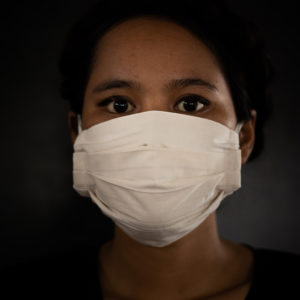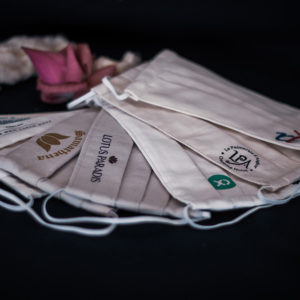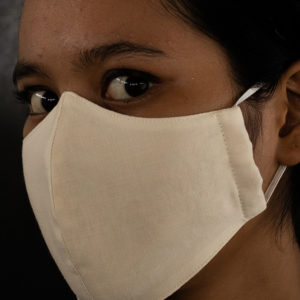Fabric Face Mask AFNOR with Lotus Microfiber filter technology
What is most safe fabric face mask?
Fabric Face Mask Afnor, uns certified, using undyed and organic fabric is the most safe for the following reasons.
Using vegan and organic fabrics, and un-dyed only
Most of mask are made with non sustainable textile like Polyester, nylon and other viscose textile (including bamboo textile). All these industrial textiles are made from petrol-chemical. They are made from petrol and chemicals only. After production, the chemicals resides in the face mask. Then, the face mask user inspire chemicals which provoke numerous diseases.
Most of the fabric face mask (>99%) are made with non sustainable dyes. While forbidden in Europe, heavy metals are generally used all over the world and are responsible of many diseases. Furthermore, the only safe dyes for the health are natural dyes, made by plants, which is rare and luxury because of the cost of its long process. It is why we do recommend un-dyed fabric face fabric mask only.
Following standard recommendations from AFNOR, CDC and National Institute of Garments.
AFNOR recommend a densely woven cotton or polycotton fabric for this mask, and at least two layers. Tight woven cotton are ideal as they’re usually good solid fabrics and suitable for high temperature washing. Technical specifications: 90g/m2, threads 33×33, 120nm.
Organizations making fabric masks can rely on the document AFNOR Spec – Barrier masks to launch manufacture. This document also offers a test protocol, currently used by the DGA (French Directorate General of Armaments) and the IFTH (French Textile & Apparel Institute). In France, manufacturers send their masks to these two bodies for tests to be carried out on their masks. Then they can confirmed that their masks offer the required level of protection. AFNOR does not itself offer approval or testing and is currently not offering certification for this product.
More info: afnor.org
Which certification for fabric face mask? UNS1 or UNS2 Certified ?
On 29 of March 2020 French Government issued a cross ministry instruction defining two categories of masks (Non-medical purpose): UNS 1 and UNS 2.
- Cat I – UNS 1: for workers who have frequent and regular contact with the public such as policemen or cashiers.
- Cat II – UNS 2: for people in a company, in a service, in a warehouse…, and who are occasionally in contact with public.
Using methodology referenced in AFNOR SPEC S76-001, UNS 1 Masks must perform at a 90% filtration level while UNS 2 masks must reach 70%. The cross ministry note, also specifies breathing resistance requirements, marking, minimum number of washes, like AFNOR SPEC S76-001.
FAQs
The AFNOR document recommends using a fabric face mask AFNOR for a maximum period of 4 hours idealy. Therefore a person who works outside of his/her home may anticipate having 3 per day: 1 for the morning, 1 for the afternoon and possibly 1 as a backup. Note: don’t forget to wash your hands or use a hydroalcoholic solution before putting a mask on and after removing it.
How many times can I use/wash my fabric face mask by AFNOR?
The AFNOR Spec document establishes the criterion that a barrier mask must at least be able to withstand being washed and dried 5 times. According to our experts, this is a realistic threshold for a mask made from non-professional fabrics acquired from various sources. The fabric aside, the assembly itself can show signs of weakness more quickly. A hand-sewn mask for example would, by its very nature, be less robust than a machine-sewn mask. For general public masks manufactured by industrial textile manufacturers, the wash thresholds are higher: 10, 20, 30 washes or more may be claimed. In all cases, every fabric mask must be inspected after each wash, before being reused.
How should I wash a used barrier mask?
The document AFNOR Spec – Barrier masks gives the recommendations specified by the health authorities. A notice by ANSM (French National Agency for Medicines and Health Products Safety) revised on 21 April, 2020, states that a used mask must be machine washed using a standard washing product at 60 degrees for at least 30 minutes. Masks should be dried either using a dryer, or in the fresh air, and then steam ironed at a temperature that will not damage the fabric.
Must I disinfect my washing machine before washing barrier masks?
This is an additional recommendation: you need to run the washing machine empty if, during a previous cycle, you accidentally put a used mask in the washing machine with other clothing and washed at a temperature below 60°C. If you wash all your masks according to health authority recommendations (60°C for at least 30 minutes), you don’t need to run the machine empty beforehand.
Can I wash used barrier masks with other clothing? Should I wash the masks immediately after use?
Yes, you can for example wash your used masks at the same time as sheets or towels that are often washable at 60°C. It is important that the mechanical aspect of the washing process is preserved. You can store used masks in a special container (a clean, resealable plastic bag) as specified in the AFNOR Spec document, and then wash them all together.
Can you boil the masks to clean them?
Boiling your barrier mask to clean it can damage fabrics. This practice is not recommended. It is preferable to machine wash at 60 degrees for at least 30 minutes.
Can I use an iron or steam iron on my mask?
Yes for care of your mask, to remove any wrinkles after washing. Special care should be taken to avoid damaging the mask’s components, in particular the head harness. But please note that ironing cannot in any circumstance replace the machine washing (cotton cycle at 60°C) necessary after each use.
Can I use a hair dryer on my mask?
Yes, to dry the mask more quickly. But please note that use of a hair dryer cannot in any circumstance replace the machine washing (cotton cycle at 60°C) necessary after each use.
How do you know if the barrier mask is effective? The flame test?
The flame test in which you blow through the mask gives no indication of the mask’s filtration efficiency. It does, however, give an idea of its air-tightness and therefore of its breathability. If the flame does not move at all, wearing the mask is likely to be difficult. If you feel uncomfortable wearing a mask when you are quiet, it will certainly be unsuitable for sustained walking or talking to others. You are then exposed to the risk of having to suddenly remove it without being able to wash your hands immediately after. Don’t forget that a barrier mask is not intended to provide a level of protection similar to an FFP2 mask. It is intended for the general public, in work situations. Furthermore, it must be in addition to social distancing and good hygiene practices.
Showing all 3 results




